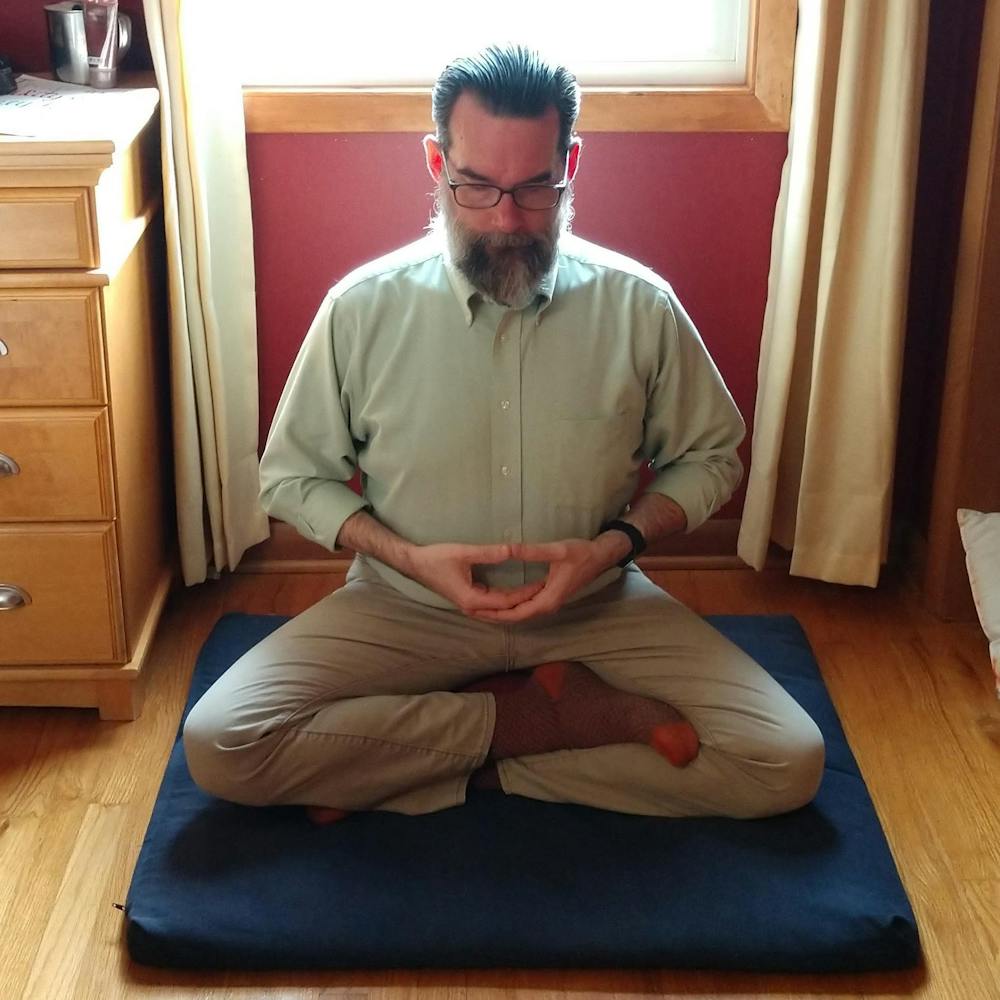A journey into the Batzcave: A faculty member's philosophy on life, music
Jay Batzner follows a unique philosophy based on two things: Soto Zen, a Japanese form of Zen Buddhism, and the Star Wars prequel trilogy.
Batzner, who teaches music composition and technology at Central Michigan University, explained that the main character of the popular science fiction movies, Anakin Skywalker, was told to deny his natural emotions, leading to a tragic ending where he became evil in pursuit of his desires. This "weird analogy," as Batzner called it, is another way of saying people should learn to accept truths in life rather than cause further harm by worrying too much.
The analogy came to Batzner through his practice of zazen, a form of seated meditation under Soto Zen in which practitioners simply seat themselves and do nothing else. He said it is unlike any other form of meditation because there is no need to focus, “you simply just sit.”
As a practitioner of zazen for around 15 years, Batzner said this philosophy has a significant impact on how he composes music and teaches his students at CMU. He said the COVID-19 pandemic has created unnecessary stress for students that could be resolved with his philosophy.
“Whatever’s happening right now is only what’s happening right now,” Batzner said. “You don’t even have to say, well right now is good, or right now is bad, or right now would be better if this, or right now would be worse if that—or what if this happens and makes it worse. That becomes a story that you’re telling yourself and it’s distracting you from what’s actually happening.”
Batzner describes his approach to writing music as “fairly simple and obsessive” and he often spends a lot of time developing an idea. He makes sure to follow his personal philosophy when writing music.
“Well, I have fun with it,” Batzner said. “There are composers that do take themselves very, very seriously and I'm not really one of them. I mean I take my work seriously, where it's not a joke to me, but there's a lightness about it.”
Batzner likes to be humorous in many aspects of his life. For instance, he named his WebEx meeting room “The Batzcave” because of his appreciation of comic books, a joke many of his students appreciate.
Near the beginning of the pandemic, Batzner composed a series of fugues based on popular songs, one of which was named “Wonderfugue,” a rendition of “Wonderwall” by Oasis. The playlist is available on his YouTube channel.
One of Batzner’s favorite things to create is experimental music. He likes to draw ideas from almost anything in the world to make his music.
“A lot of my music will take inspiration from something that isn't inherently musical, just to kind of give me a framing idea,” Batzner said.
Batzner said he recently wrote a piece for solo guitar inspired by a graphic novel. He also has written a piece called “Mancala Variations,” which is available on Spotify. Batzner created all of the sounds for the piece by recording himself playing with a Mancala board.
Perhaps one of his most abstract inspirations came from a colleague, John Nichol, who is a saxophone professor at CMU.
“There was a solo saxophone piece that I finished recently for John Nichol,” Batzner said. “He really liked the arrangement of the pushpins on my bulletin board outside of my office one day. It was just kind of a random, you know, thing. It wasn't like I put them somewhere they were just kind of there right? And so he's like, you can make a piece out of that. So I took a couple of pictures of it and wrote something kind of based on that, and I mean, that was sort of fun.”
The name of the piece was “Pushpins.”
When it comes to teaching his students, Batzner encourages his students to be proud of the music they compose and to make their work significant to them. When asked if he takes pride in the progress of his students, Batzner said he refrains from pointing the spotlight at himself.
“(The score) is not going to say that Jay Batzner wrote this piece,” Batzner said. “It’s their name that's on there. I think the pride comes from me basically forcing my students to see that they're awesome—that they're doing good things.” .
Experimental music was one of Batzner’s recent teaching subjects, which he said he enjoyed far more than he anticipated.
“That was a lot more fun that I thought it was going to be,” Batzner said . “Because I thought the weirder the music got, the more the students were going to resist it, but it was the exact opposite. The weirder we got, the more into it they were.”
Batzner has a personal website through which many of his pieces and accomplishments can be viewed. Among other things, he said, he is working on a one-act opera.
Especially now, during the stressful times created by a global pandemic, Batzner’s practice of zazen is as important as ever for guiding how he lives and works.
“[Zazen] has really informed my core way of interacting with the world and other people,” Batzner said. “Things are what they are, and a lot of suffering comes from trying to change things from being what they are.”







